This article was medically reviewed by Jessica Ahmann, PhD. Dr. Ahmann is a Doctor of Nursing Practice at Mid Dakota Clinic in North Dakota, where she specializes in Hematology and Oncology. She received her Doctor of Nursing Practice from the University of North Dakota in 2015. She is certified by the American Nurses Credentialing Center and is a member of the Oncology Nursing Society and the North Dakota Nurse Practitioner Association.
There are 8 references cited in this article, which can be found at the bottom of the page.
This article has been viewed 472,363 times.
Inflammation of the skin is known as dermatitis. There are many types of dermatitis and numerous causes. The most common type of skin inflammation is contact dermatitis, which occurs when your skin comes into direct contact with an irritant. Your skin reacts by becoming inflamed and often swollen and reddened. Your skin may produce raised bumps, resulting in an itchy rash. You can learn how to heal inflamed skin at home, but you should always consult your doctor for the best course of treatment.
Steps
Getting Medical Treatment
-
1Call your doctor. Dermatitis is the most common type of skin inflammation, and is also known as a rash. Rashes are a swelling or irritation of the skin, and can be itchy, blistered, or bumpy. A lot of times, you can treat rashes at home, but if your rash appears frequently or lasts more than two days, it is time to consult your physician. If your rash is so uncomfortable that you are constantly distracted, contact your doctor right away.[1]
- Dermatitis is not contagious.
- When you call your doctor's office be sure to describe your symptoms in detail, especially any vomiting or fever. Be sure to mention if you have been exposed to a new environment, new foods or new products, such as soaps or lotions.
- If your doctor cannot see you within a day or so, you can try going to a walk-in clinic. Many pharmacies offer in store clinics. A doctor or nurse practitioner can examine your skin and help you figure out a treatment plan.
-
2Consult a dermatologist. If you have a chronic (recurring or persistent) case of skin inflammation, it is probably time to visit a dermatologist. A dermatologist is a doctor specializing in treatment of the skin. They can help you figure out the underlying cause of your skin issue and prescribe any necessary medication.[2]
- Ask your primary care physician to recommend a dermatologist that they trust.
- Make sure your insurance plan covers the dermatologist that you choose.
Advertisement -
3Talk to your pharmacist. There are many over-the-counter medications that can help heal your skin inflammation; however, it can be overwhelming to try to select the product that will be most beneficial to your individual problem. Your local pharmacist is a great resource. They are familiar with the active ingredients in many products, so ask for advice on which one to purchase.[3]
- Remember that a pharmacist is a medical professional. Don't be afraid to describe your rash in detail and describe your symptoms.
- You can also ask the pharmacist to recommend a generic alternative to some of the name brand products. You'll get the same health benefits and save some money.
Trying Home Remedies
-
1Use food. If your inflammation is caused by sunburn, an allergic reaction, or is simply dry and itchy, there are many ways to treat yourself at home. Your kitchen is a great place to find ingredients that can help soothe and heal your irritated skin. For example, you can apply cucumber slices to red, irritated areas for almost instant relief.
- Honey is another great home remedy because it is a natural anti-inflammatory. Rinse your skin with warm water, then apply a thin layer of honey. Rinse after 30 minutes. Your redness and irritation should be reduced.[4]
- If sunburn is the cause of your inflammation, you can make a paste using the gel from an aloe vera plant. Mix a small amount of the gel with equal parts cider vinegar and white vinegar and smooth onto irritated skin.
-
2Try essential oils. Essential oils are an inexpensive and effective way to heal your skin at home. Most oils can be purchased at your local health food store. Some pharmacies and grocery stores also stock them. Essential oils should often be placed in a carrier oil (like almond oil or coconut oil) and not directly applied to the skin as this can cause further irritation. Instead follow recommended guidelines for essential oils, staff at health food stores can be a good resource for mixing essential oils for topical use.
-
3Buy the right products. You can help heal your skin by making sure that every product you use is good for your skin type. This applies to any moisturizer, cleanser, or cosmetic. Pay attention to medicated creams, but also look at the ingredients for all of your skin-care products.[5]
- Dermatologists report that one of the most common causes of skin irritation is that people are using too many products on their skin. Doctors suggest a simple regimen of a mild cleanser, chemical free sunscreen, and fragrance free moisturizer.
- Look for products that are labeled "gentle" and for "sensitive skin." These typically contain less potentially irritating ingredients.
- Ask your dermatologist to recommend products that are right for your particular skin type.
Understanding the Causes of Inflammation
-
1Know the common types of inflammation. Before you attempt to treat your skin inflammation, you should familiarize yourself with common types of problems. This way, you can more effectively identify your ailment. This will help you figure out the safest, most healing treatment.[6]
- Eczema is a medical term used to describe several types of skin conditions that are characterized by redness and irritation.
- Psoriasis is another common skin problem. A common symptom of psoriasis is a thick, red, scaly area that covers parts of the skin.
- Rosacea typically affects facial skin and is a common disorder that causes redness and irritation. Make sure to consult your doctor if you suspect you have any of these conditions.
-
2Learn about environmental factors. Your skin inflammation might also be caused by external factors. Sunburn is one of the most common, but other causes include allergens such as food and plants. If you touch or eat something you are allergic to, you might see inflammation in your skin.[7]
- Many people suffer from dermatitis if they wear jewelry that contains even a small amount of nickel. If you know that your skin is sensitive, make sure to find out what your accessories are made of.
- Plants are also a common irritant. Some of the most common plants that cause dermatitis are poison ivy and poison oak. Your skin can be effected not only if you touch the plant itself, but if you touch another person or animal who has been in contact with it.
- Food allergens can also cause skin inflammation, and oftentimes, hives. If you regularly suffer from hives, you should see an allergist to help you determine the cause.
-
3Consider genetics. Some skin conditions are inherited. These are passed from generation to generation through your DNA, and there is no way to prevent this from happening. One common genetic disorder is ichthyosis vulgaris, which includes symptoms such as severely dry and scaly skin.[8]
- Another genetic condition is xeroderma pigmentosa, which causes extreme sensitivity to light. This results in frequent blistering from sunburn.
- If you have a chronic skin condition, make sure to consult your doctor. Ask if you might have a genetic condition that can be treated.
-
4Try preventative measures. In addition to healing your skin inflammation, you can also take steps to prevent it from occurring in the first place. One way is to avoid foods that are known to cause redness and inflammation. Spicy foods are one of the common culprits. Instead of flavoring your food with black or cayenne pepper, try more gentle flavor additions such as ginger or turmeric.[9]
- Limit your alcohol intake. Drinking large amounts of alcohol over a long period of time can result in chronically red skin.
- Dress appropriately for the weather. Bundle up in the winter, taking care to cover your face. That is where your skin is the most sensitive. Also, make sure to cover your skin whenever you are exposed to the sun.
Warnings
- Avoid the use of any new topical products not designed to help with the skin inflammation until your skin has healed.⧼thumbs_response⧽
- If you have come into contact with poison ivy or oak, wash all clothing that may have touched the plants to help prevent cross contamination.⧼thumbs_response⧽
- Some anti-inflammatory medications may cause severe headaches in certain people. If this affects you and you are looking for alternatives, try acupuncture or simple pain medication instead.⧼thumbs_response⧽
References
- ↑ http://dhss.delaware.gov/dhss/dph/files/rashesfaq.pdf
- ↑ https://my.clevelandclinic.org/health/articles/4089-dermatitis
- ↑ https://www.nhs.uk/conditions/contact-dermatitis/
- ↑ https://www.webmd.com/vitamins/ai/ingredientmono-738/honey
- ↑ https://www.aad.org/public/diseases/eczema/atopic-dermatitis-coping
- ↑ http://www.webmd.com/skin-problems-and-treatments/guide/skin-problems-treatments-symptoms-types
- ↑ http://www.aaaai.org/conditions-and-treatments/allergies/skin-allergy.aspx
- ↑ https://my.clevelandclinic.org/health/articles/4089-dermatitis
- ↑ http://www.huffingtonpost.com/2012/12/12/redness-reduce-skin-redness_n_2279090.html
About This Article
The best way to heal inflamed skin is to see a doctor. If you’d like to try home treatments first, you can combat inflammation by applying cucumber slices or honey onto your skin. If your skin is inflamed because of a burn, try aloe vera gel. If your inflammation is caused by extremely dry skin, try mashing avocado and applying it to your skin for 10 minutes at a time. You can also try mixing essential oils with coconut oil and applying them to your skin. For help from our Medical reviewer about why your skin might be inflamed, keep reading...
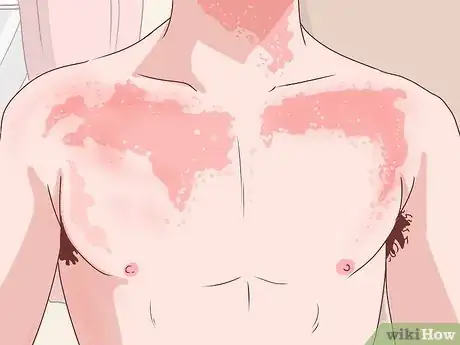
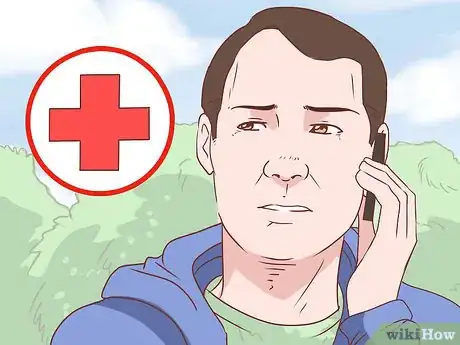


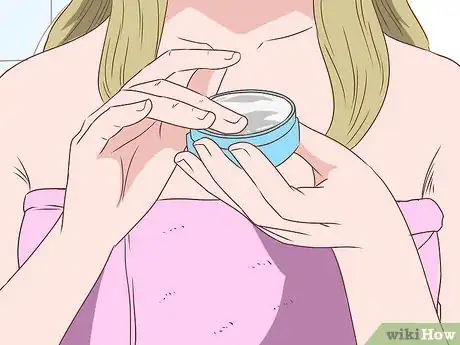
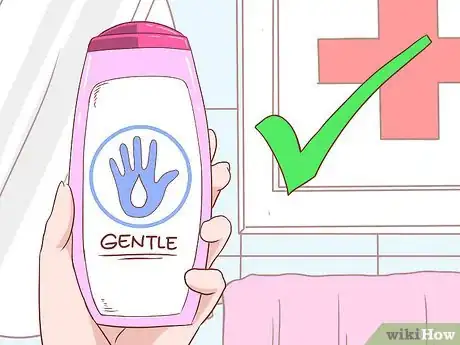

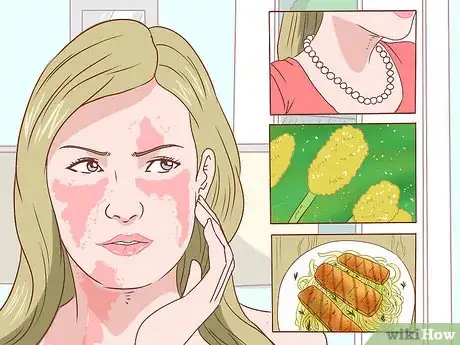









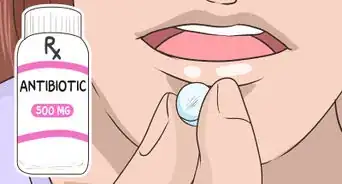
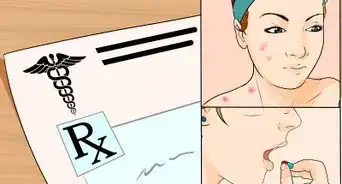





















































Medical Disclaimer
The content of this article is not intended to be a substitute for professional medical advice, examination, diagnosis, or treatment. You should always contact your doctor or other qualified healthcare professional before starting, changing, or stopping any kind of health treatment.
Read More...